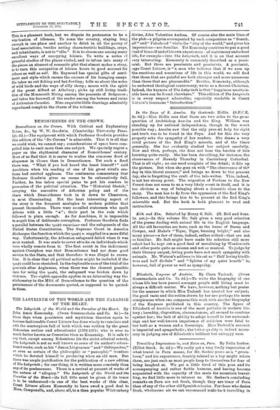TILE LABYRINTH OF THE WORLD AND THE PARADISE OF THE
HEART.
The Labyrinth of the World and the Paradise of the Heart. By John Amos Komensky. (Swan Sonnenschein and Co. 6s.)—In these days when pessimism and mysticism threaten again to become fashionable Count Liitzow has done wisely to translate and edit the masterpiece full of both which was written by the great Bohemian author and educationist (1592-1671) who is ever so much better known as Comenias than as Komensky. It is safe to say that, except among Bohemians (in the strict ethnical sense), The Labyrinth is not so well known as some of its author's educa- tional works, such as his " Janus, Linguarum " and " Orbispectus," or even as certain of the philosophic or " pansophic " treatises which he devoted himself to producing when an old man. But there was ample justification for the publication of a new edition of The Labyrinth ; for one thing, it is written more concisely than any of its predecessors. There is a revival at present of works of the nature of "allegory." The Labyrinth of the World and the Paradise of the Heart—its full title must be given if its tenor it to be understood—is one of the beat works of this class. Count Letxow chows Komensky to have owed a good deal to Mere, Campanella, and, above all, to a then popular Wiirtemberg divine, John Valentine Andrea. Of course also the main lines of the plot—a pilgrim accompanied by such companions as " Search_ all" and" Falsehood " visits the "city of the world," and gives his impressions—are familiar. Yet Komensky contrives to put a good deal of himself andof his own experiences - of matrimony and achool life, for example—into The Labyrinth, and it is on that account very interesting. Komensky is commonly described as a pessi- mist. But there are pessimists and pessimists. A pessimist, says Count Liitzow, is "a man who believes that if we sum up the emotions and sensations of life in this world, we will find that those that are painful are both stronger and more numerous than those that are pleasurable." Besides, Komensky, although he eschewed theological controversy, wrote as a devout Christian. Indeed, the keynote of The Labyrinth is that " happiness unattain- able here can be found elsewhere." This edition of The Labyrinth is in every respect admirable; especially readable is Count Liitzow's luminous "Introduction."


























































 Previous page
Previous page